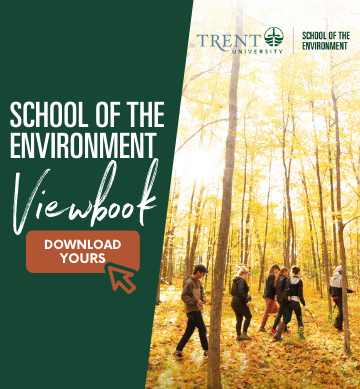What is a Trent School of Environment Placement?
Trent University encourages experiential education for all students. Experiential education can take many forms, for example, community service, applied research, field placements, internships, in-class experiential learning, and conference presentations.
Gaining real-world experience while studying gives students the opportunity to envision a future career and can lead to the development of lasting connections in the workforce. Gain program-related experience in a professional work environment for academic credit. Work alongside industry leaders; analyze and monitor trends in water quality; gain international conservation insights.
Working with employers in the local community, students combine professional experience with reflective practice. The student will be provided a learning opportunity where they will engage in productive work and apply what they have learned from courses. Experiential learning occurs on many levels, professionally and personally, with students learning much more than the assigned work task.
Placements build confidence, develop social skills, enhance professional knowledge and networks, encourage contributions as a team member, and instill the responsibility of being present and contributing on a set work schedule.
The Trent School of Environment placement model is student-centered with a focus on professional development. We aim to place students in an organization that provides learning opportunities/ work experience directly related to their academic program of study and career objectives.
The TSE offers the following Placement Courses:
EGEO-4000H: Env. Geoscience Placement/Outreach
A placement experience with a government agency, school, industry, or non-governmental agency, or related laboratory or work unit, on themes and principles learned during coursework associated with the Environmental Geoscience program in Trent School of the Environment.
Prerequisites: Open only to students who are registered in the Environmental Geoscience program with a minimum cumulative average of 75% and 13.5 university credits. Students are eligible to apply in the year before anticipated enrolment in the course
ERSC-ERST-GEOG-SAFS 3890H: Placement Course
A placement experience with a government agency, industry, or non-governmental agency, or related laboratory or work unit, on themes and principles learned during coursework associated with the Environmental & Resource Science/ Studies, Geography, or Sustainable Agriculture and Food Systems programs. Students work closely with the instructor and placement host to determine deliverables that will be presented to various stakeholders as technical report(s) and/or presentation(s).
Prerequisites: A minimum cumulative average of 75% and 9.0 university credits including both ERSC 1010H and 1020H, or both GEOG 1030H and 1040H, or both SAFS 1001H and 1002H
SAFS-4003D: Research & Placement in SAFS
A research-intensive course on a specific topic or a placement experience with a government agency, industry, or non-governmental agency, or related laboratory or work unit, on themes and principles learned during coursework associated the Sustainable Agriculture and Food Systems program in the School of Environment.
Prerequisites: Only open to Sustainable Agriculture and Food Systems majors or joint majors with a minimum average of 75% in 2.0 SAFS credits. Written permission must be obtained from the supervising instructor and the TSE director before registration




